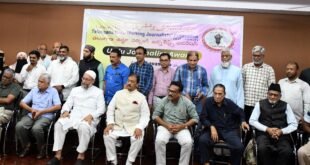By: Asad Mirza
The Covid-19 has given birth to many controversies, over reactions of the world leaders to the pandemic and its subsequent control by their governments, to who spread or manufactured the virus, China or the US. The latest to join this series of controversies is a 26-minute slickly made documentary, featuring Judy Mikovits.
In the documentary film ‘Plandemic’, Ms Mikovits makes claims that the virus must have been released from a laboratory environment and could not possibly be naturally-occurring; that using masks and gloves actually makes people sicker, and that closing beaches is ‘insanity’ because of ‘healing microbes’ in the water. However, such claims are not supported by reliable medical and scientific advice. The video also suggests that the number of deaths is being deliberately falsified the world over and in particular in the US, in order to exert control over the population.
Facebook, YouTube and Vimeo have removed the video documentary from their sites. The Economist reports a Vimeo spokesperson as saying that the company ’stands firm in keeping our platform safe from content that spreads harmful and misleading health information. The video in question has been removed … for violating these very policies.’ But since it was uploaded in the beginning of the week, the video has been viewed million of times on various platforms.
The Washington Post profiling Ms Mikovits, reports she graduated with a PhD in biochemistry from George Washington University, spent 22 years working for the National Cancer Institute. She left that job in 2001, and the New York Times reported in a 2009 profile that Mikovits moved from Maryland to California to work for a drug company that later failed. She ended up bar tending for a yacht club, the Times reported, before she was recruited to lead a privately funded research clinic, Whittemore Peterson Institute, which was dedicated to finding the cause of chronic fatigue syndrome. When Judy Mikovits co-wrote a 2009 research paper that linked the mysterious condition known as chronic fatigue syndrome to a retrovirus that came from mice, thousands of sick patients hoping for relief rallied behind her. The scientific riddle was solved, they thought.
The Economist in its report on the documentary and Ms Mikovits says that however, less than two years later, those hopes were dashed when follow-up studies failed to replicate the findings and the respected scientific journal Science retracted the paper. Researchers postulated that the study’s inaccurate conclusions were the result of contamination of the lab samples, and the theory that a virus might be the source of the still-mysterious condition died. Her employers at the Whittemore Peterson Institute in Nevada fired her in October 2011.
But Mikovits’s conviction that her theory was correct, and her belief that the top scientific minds in the United States conspired to ruin her career, never faded. In Plandemic she now accuses the US scientific establishment of conspiracy again. She alleges that the doctors and experts shaping public policy in response to the novel coronavirus pandemic have silenced dissenting voices and misled the public for sinister reasons.
Prominent among them are Dr. Anthony Fauci, the director of the National Institute of Allergy and Infectious Diseases since 1984, Dr. Robert Redfield, the current director of the Centres for Disease Control and Prevention, and Dr, Robert Gallo, an AIDS pioneer who is now director at the Institute of Human Virology and scientific director at the Global Virus Network.
Mikovits also says Fauci has profited from patents bearing his name that were derived from research done at NIAID, by other scientists. Mikovits also says it’s not possible for the coronavirus, formally known as SARS-CoV-2, to have evolved from the original severe acute respiratory syndrome virus, stating that ‘would take it up to 800 years to occur.’
The NPR in its report on the controversy says that her statement belies the fact that viruses are well known to evolve rapidly, with the seasonal flu strain, for instance, changing so quickly that a new vaccine is required each year. In a 2012 study of one virus, researchers at Michigan State University found that if its normal route for infection was blocked, it only took a matter of weeks for it to evolve another one.
And the idea that masks activated the virus doesn’t add up either. The CDC and WHO initially didn’t advise people to wear masks. And for weeks, the virus was still spreading worldwide.
What’s most upsetting to many people is who they see sharing it: reasonable, intelligent people who normally don’t fall for conspiracy theories or pseudoscience. This leads one to wonder what is going on?
Forbes magazine is of the view that many people who are privately or casually sharing it are saying, ‘This is interesting. What do you think of it?’ Most genuinely don’t know what to make of it. They aren’t trying to spread misinformation. They’re not the types to believe or share conspiracy theories. They’re taken in by the video’s slick appearance and by its use of persuasive techniques and really want to know what you think.
This video has been extremely successful at promoting misinformation for three reasons, according to Forbes: First, it taps into people’s uncertainty, anxiety and need for answers—common reasons anyone is attracted to a conspiracy theory. Second, it is packaged very professionally and uses common conventions people already associate with factual documentaries. Third, it successfully exploits ancient but extremely effective methods of persuasion.
In today’s edutainment and infotainment world there is more uncertainty about our world right now than there has been in decades, perhaps a century. Every individual has so many unanswered questions—including the people we ordinarily look up to for answers. Uncertainty is uncomfortable. People want answers. Conspiracy theories can be comforting. This video appears to provide answers that fit together, that seem to make sense, that sound credible, or at least ‘interesting and worth considering.’
—About the author:
Asad Mirza is a Sr journalist based in New Delhi. In his career spanning more than 20 years, he was associated with BBC Urdu Service and Khaleej Times of Dubai. He writes on Muslims, educational, international affairs and interfaith issues. Email: asad.mirza.nd@gmail.com
 Gawah (The Witness) – Hyderabad India Fearless By Birth, Pristine by Choice – First National Urdu Weekly From South India – Latest News, Breaking News, Special Stories, Interviews, Islamic, World, India, National News
Gawah (The Witness) – Hyderabad India Fearless By Birth, Pristine by Choice – First National Urdu Weekly From South India – Latest News, Breaking News, Special Stories, Interviews, Islamic, World, India, National News



